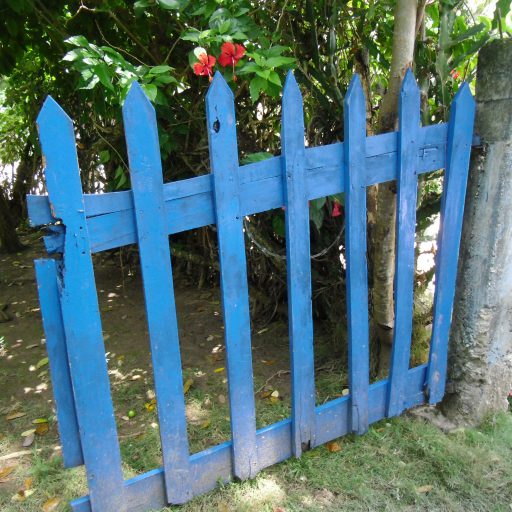Haiti. The ’70s.
“The grass will only grow…”
“…if we water it. We need lots of water. And lots of black dirt,” he says.
“If we use our cistern water, we’ll have to stop bathing as of right now. It’s not enough. Either bath or grass,” I declare, standing beside him on our terrace, hands on my hips, overlooking what somehow wanted to become a garden.
“Pfffff, this looks horrible. It’s not a garden, not anything, it’s just…and we need…,” he retorts, scratching his head, staring at the mounds.
Hmm, well, yes. Right. The construction work left us with yellow-grayish heaps of dirt and stones piling quite high around the house. It’s November in Haiti, rainy season just complete and four dry months are laying ahead. If we are lucky, we’ll get a rain shower or two around Christmas or New Year’s. Defying all naysayers, we moved into our new house on the top of a mountain, proud of the achievement, even without the green grass.
Only a year ago, we discovered this hidden, lonesome mountain edge. We purchased the land from an old spinster, who was selling off her possessions before someone could claim them after her death. Never giving one thought to the inevitable challenge of building a house on a steep, inaccessible, dry, rugged site in a country where heavy machinery could not be found, and work was done shovel in hand.
We didn’t care. The beloved and I were fascinated by what we had seen and invited our parents to see the site.
“But…there is no road.” His father breathed out deeply, “how will you get us up there? Walking? No!… and building? What about material, the blocs, timber, how to get water to mix concrete?” His questions were endless. I opened the doors of the 4×4 and cajoled him to get in. “We acquired this Jeep exactly for this purpose. Get in, you’ll see.”
On a winding goat-path leading up, one wheel or the other hanging over the edge at times, we inch upwards. I glance at our parents. Road fear written all over their faces, they don’t dare to glimpse to the side. The one acting coolest is my mother-in-law. Stoic-faced she looks ahead.
Last curve. The beloved and I grin at each other, anticipating.
“Oh, oh-oh, ohhhhhh.”
“What is…?”
“Do you see that…?”
“Waow…?
“I don’t believe…”
We laugh out loud. “Yes. We had the same reaction on the very first day,” I cannot stop giggling.
Before us spreads the most incredible view spanning from Port-au-Prince to the neighboring country. The capital snuggles up to the sweeping seashore on our left, embedded by mountains. An immense, lush valley with its sugar cane fields stretches below. Some sparse villages send thin spirals of charcoal fires straight up into the sky and the large blue lake Azuei to our right marks the border to the Dominican Republic. Beyond the plain, long chains of mountains have a small turquoise lake, Trou Caïman, at their feet. Heaps of white Caribbean clouds adorn some of the mountain tops and sail through the bright, sunny sky.
Dèyè mòn gen mòn.
Behind the mountains are more mountains, as the Haitian proverb says. A breathtaking view.
Maman, the builder of multiple family houses, nods. Twice. Her husband still shakes his head. My father, born and raised on German flat lands, is fiercely walking through the thorns and thistles covering the ground, then stops and remains still, taking the view in. My mother remains speechless.
“You guys are a bit crazy.” I knew my dad would say that. He knows about construction.
“Yes, yes. I agree, they are both quite a bit nuts,” the other father chimes in.
“But it’s all worth it.”
“Yes, it is.” They all nod, without turning from the view.
We knew they would be as spellbound as we were. We had their support to tackle a nearly impossible project.
And so, yesterday, we brought the last piece of furniture up our unpaved, bumpy mountain road. It had taken longer to turn the goat-path into a road than building the house. Meanwhile, I had learned to turn my own Honda midway, drive it up backwards, and negotiate a 90-degree bend into our yard. The only way the car could make it! But I don’t mind the maneuvers. The view is gorgeous. No city water, only cisterns. No phone lines. But recently we got electricity, which we consider—beside the view—the greatest luxury of all.
“We’ll build yet another cistern to collect and filter our sewage water,” my beloved starts off. I quickly catch on, “yes, to water the greens, the trees, the bushes we can see now only in our imagination.”
“And the grass will not only grow, the enzymes will make it thrive, I believe,” my practical husband throws in.
Smiling, we sigh and bump shoulders with tenderness. It will grow, our grass.


Very sweet!
LikeLike
Thanks Tara
LikeLike
Hello Anne. So this is how Arc Au Bois started ? Wonderful story. I love it.
Where are you living now ?
Please use my izmerymarine@gmail.com
Easier for me.
Keep up writing more Anne !
LikeLike
Hi Marine, thanks for your sweet comment. I had to laugh that after all those years you remember how we called our mountain. Yes, that’s how it started, and now it’s a “quartier”.
LikeLike
You have a gift for writing, Anne. Feels like I can see that view! Thanks for inviting me.
LikeLike
Thank you, Carine, I appreciate your comment. Hope all is well with you. 🙂
LikeLike
Wonderful Anne. Thank you for inviting me. So nice to hear from you.
LikeLike
Hi Al, thanks for reading me. I am thinking about you often. What’s new on the poetry side?
LikeLike